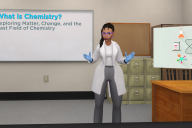You have /5 articles left.
Sign up for a free account or log in.
This new feature, Movers and Shakers, explores the job changes of leaders in the world of digital learning.
New Position: Marni Baker Stein is becoming provost and chief learning officer at Western Governors University, in Utah.
Last Position: Chief innovation officer, University of Texas System's Institute for Transformational Learning (UTx). Before that, senior associate dean of Columbia University’s School of Continuing Education.
The Opportunity at WGU: Stein has spent most of her career to date helping well-established traditional universities -- Columbia University, the University of Pennsylvania, and most recently the 14 campuses of the University of Texas System -- "move toward learning-centeredness" and adopt new approaches to personalized learning.
Rewarding as that has been, Stein says "it was just super appealing to me" to envision moving to an institution where that work is at the absolute core of the mission. Western Governors started in 1997 as an unusual private nonprofit institution with support from a slew of Western states and as an experiment in competency-based learning, and has experienced explosive growth in the last several years. "It's exciting to go to a new institution that is just 20 years old, still at the beginning of its story. And to be a part of helping them refine and optimize what they've learned over the last 20 years."
Stein says she expects much of her work at WGU to focus on ensuring that its learning experiences are as effective as possible at "the scale they are now [roughly 82,000 students] and the scale they want to be."
Major Accomplishments (and Challenges) at UTx: In four years at the University of Texas System, Stein and her team at the Institute for Transformational Learning have begun to build out a set of "industry-focused, affordable and accelerated learning experiences that can be accessed by highly mobile and employed learners." They include a competency-based bachelor's degree in biomedical sciences at the system's Rio Grande Valley campus delivered entirely online, a dual credit program aimed at helping high school students prepare for university-level work, and a new cybersecurity bachelor's program through the UT campus in San Antonio. Those programs and others are delivered through a learning relationship management software platform that UTx built.
The initiatives created by the Texas institution are designed as new "models and prototypes" of learning -- with new curriculums, new technologies, new modes of assessment, and new approaches to teaching and student services, Stein says. "And we've done that, with a handful of programs ... that are super innovative."
Getting there has not been easy, though. Creating programs that are truly "learner-centered" requires significant changes in how colleges (and their faculty and staff members) operate: "You have to think about curricular pathways in a different way. You have to think about assessment in a different way, time to degree and student pacing in a particular way," Stein says. "It can be extremely disruptive, in a good way. But it causes tension, pressure, for the many people who are involved. When we think about how we organize work, with departments, faculty time, it's really challenging to do it."
That is especially true, she notes, in a "large state entity" like the UT system, and to do it across campuses and at scale. "These sorts of changes are really hard-won in a traditional setting, and tenuous once you get them," Stein says.
It's not that Stein is leaving UT because she feels she's been working against the grain, or because "transformation was too hard or there wasn't transformation," she says.
It's that "I really wanted to dedicate the next few years to a place where that work, in and of itself, is their mission."
The Big Picture: Stein's career move might be read as an indication that bringing about fundamental changes in learning at traditional colleges and universities is hard enough to send even dedicated professionals running for the refuge of more amenable environments.
Stein discourages drawing that sort of conclusion, even as she acknowledges the impediments traditional colleges face in transforming themselves.
"There's been a recognition over last several years that it's really important to understand the diverse range of learners we have on our campuses, and we've seen real progress in student services, both in terms of the policies and the services themselves, and in the data infrastructure we use to understand students," Stein says. It's been exciting to watch.
"My core interest, though, is in the design of [academic] programs and curriculums and the learning experience itself, and transformation is harder there, striking right at how higher ed sees itself, how resources are allocated, how faculty do their jobs," she adds. "It's going to happen, but it's going to take longer....
"At this point in my career, I just really wanted to get a chance to work in a space that operates without those impediments."








